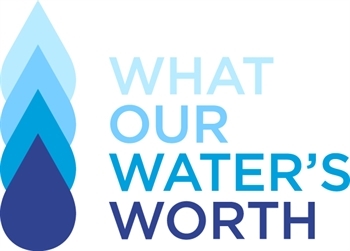I talk to a lot of people about water, and many of the conversations end something like this.
Me: "We really need to invest more in our water infrastructure."
A perfectly nice guy: "Yeah, but water's free. We shouldn't have to pay for it."
That belief is at the root of many of our water problems. Here's the issue: water itself may be free, but the energy to pump it, the chemicals to treat it, the pipes to move it, and the labor to maintain those pipes are not. In most cases they're actually getting more expensive. So how do you motivate greater investment in protecting and providing water if people think water isn't worth anything? If people think water should be free, how do you set water rates at a level where they cover the full cost of operations, maintenance and future capital investment? How do you get to sustainability if people don't value water?
We've wrestled with those questions for a long time. But in the end, they're the wrong questions to ask. Instead, we should be asking what they do value, how much it's worth to them, and what they would be willing to do to protect it.
Case in point: people value taste, quality and convenience. How do I know? Because over the next 20 years Americans will spend about $235 billion on bottled water. What's ironic is that the water itself is often just tap water. Dasani and Aquafina, for instance, run municipal tap water through a giant filter and put it in bottles. That's it. A gallon of bottled water costs about $2. For $2 you get 1,000 gallons of Chicago tap water. So people are willing to pay 1,000 times more for perceived taste, quality and convenience, which has to be one of the great marketing accomplishments of all time. People will pay for things they value. That's good, because US EPA estimates that we need to spend about $335 billion over the next 20 years to get our drinking water infrastructure up to snuff.
What else do people value? I think they value safe, unpolluted water. Most people dislike the concept of waste, so they value pipes that don't leak. Sewage backing up into your basement is nasty, and wading through stagnant water to get to your car because the street drain is clogged is pretty annoying too—so I'd say people value the idea of "floodlessness." Other people value wetlands, golf courses, and flower gardens. Businesses value certainty, so they want to know the community they're in will still have water a few years down the road. In sum, people value a lot of things related to water, even if they water itself isn't at the top of their list.

With that in mind, MPC and Openlands have launched What Our Water's Worth (WOWW). Through a web site, e-newsletter, Facebook page, and other media, we'll spend the next couple of years exploring a central idea: From Lake Michigan to the Fox River, how we use our water resources – including what we conserve, how much we waste, and what we choose to invest in water quality – is up to each of us. The campaign will feature stories and video interviews with people from our region who value water in remarkable ways, data and an interactive map explaining where our water comes from, and tips and resources for responsible water use. Illinois American Water is generously sponsoring WOWW, but we're looking for additional partners too.
Find out where your water comes from by visiting the What Our Water’s Worth web site >>
Subscribe to the What Our Water’s Worth monthly e-newsletter >>
Get even more great content from What Our Water’s Worth on Facebook >>
Help us get the word out by encouraging your community to use WOWW in newsletters, like the Alliance for Water Efficiency recently did. Be like the Shedd Aquarium and tell your Facebook friends about WOWW. Take the monthly stewardship tips to heart and talk with your neighbors about protecting water on your street. Our ability to affect positive change is totally contingent on getting the word out, so please join us in making water something our entire region values!